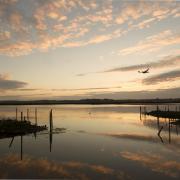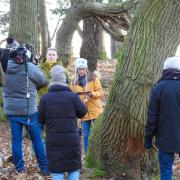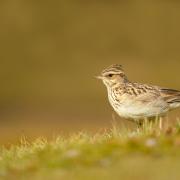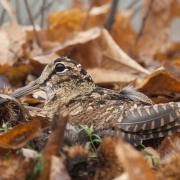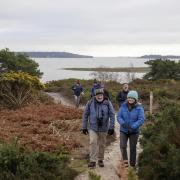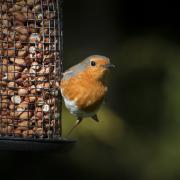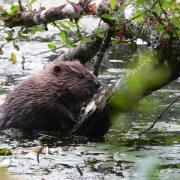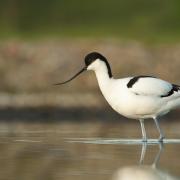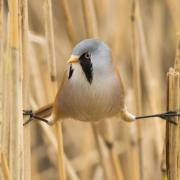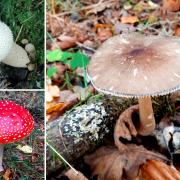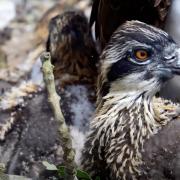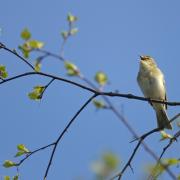The RSPB's Sophie Atherton looks ahead to a year of birds.
It's January, time of New Year's resolutions and making plans for the coming 12 months. If you'd like 2009 to be a year of birds, here are a few suggestions to inspire you.
January is the month of the RSPB's Big Garden Birdwatch: count the highest number of each bird species you see in an hour. For example, if you see three sparrows to begin with, but later in your hour you see seven, record the total as 'seven'. Some people who are really into birds keep a list of the different species they've seen from their house - something you might like to do this year? I've got 28 on mine, including bullfinch, goldcrest and raven. Can you beat that?
February includes National Nestbox Week; you could buy or make one. Put it up in a quiet place out of the reach of cats, generally between two and five metres up a tree, fence or wall. Try to face it between north and east, to avoid strong sunlight and the wettest winds. Tilt the box forward slightly so that driving rain hits the roof and doesn't enter the box. Put different types of box in different places around the garden. Sparrows and starlings are in serious decline. Putting a nestbox high in the eaves will help local populations of these birds.
March is when most birds begin courtship. Tawny owls will be at their most active, great tits will begin calling, song thrushes are tuning up. As nest building begins, garden birds fly back and forth with twigs and other plant debris. Help them out by tying up bunches of tiny twigs, dried moss, and other stringy vegetable matter near your feeders. Tiny warblers such as chiffchaffs return from Africa having made the perilous journey across Europe. They may hit first landfall at places like Portland Bill. They are difficult to spot, although you might hear them singing in hedgerows and thickets.
April Migration is in full swing. Swallows, martins and warblers will be piling in. Nesting is under way and by the end of the month the first broods may be with us. It is a good time to look for woodland birds, before the leaves are fully out. Shrubs like pyracantha in your garden will please species like blackbirds. As well as providing food, thick and thorny bushes like these shelter young birds from predators. You may want to tidy up after winter, but if you can leave some areas undisturbed it helps wildlife. Birds may be nesting in hedges and shrubs, so wait until after the nesting season to trim them. Additionally, if you do disturb nesting birds you are breaking the law!
May is the month of birdsong, a great time to get out and do some bird listening. Get a CD of birdcalls to help you learn which birds are which without having to see them. As supplies of nuts and berries dwindle, visiting and resident birds alike need good weather to generate fresh food in the form of insects and other small animals. You can help them out by feeding all year round, but get advice on what sort of food is most appropriate.
June Get out on the Dorset heaths to look for nightjars. These summer migrants from Africa hunt for food at dusk, hoovering up moths and other insects with wide-open beaks, having spotted them with big beady eyes. In the garden you'll see adult birds gathering food for fledglings. Most garden birds, even the seed-eating finches, tend to feed their young on insects at this time of year. You may notice birds taking caterpillars or insect larvae off to the nest, before returning to boost their own energy levels from the bird table or feeder. In hot weather, avoid putting out dry food such as stale bread, as this can hasten dehydration. Make sure there is water for them to drink.
July The breeding season draws to a close and birds seem to disappear - this is because many are moulting and re-grow new feathers now. They need to hide from predators when they do this, since it can be difficult for them to fly away. Some seabirds may still be feeding young, while others - such as guillemots - will be heading for the water and for a life at sea over the winter.
August Birds will still be scarce as the moulting period continues. Wintering waders and seabirds start to turn up. Look out for whimbrels and black-tailed godwits. Around the coast, those with the patience to watch the seas for some time may see incoming Manx and Balearic shearwaters that feed off the Dorset coast at this time of year too. Also look for gannets as they range far and wide collecting food for their young. Summer migrants, such as swift, will be preparing to leave.
September is a good month to visit the RSPB's Arne Nature Reserve and Poole Harbour to look out for ospreys as they stop off on migration. These fish-eating birds of prey are on their way to Africa. Autumn migration will see the comings and goings of winter and summer migrants with birds like red-breasted merganser heading for places such as the harbour.
October is the month of the RSPB's Feed the Birds Day and the time when 'Viking invaders' arrive - berry-eating birds like redwings and fieldfares coming in from Scandinavia. A bird-friendly garden should be full of seeds, nuts and berries at this time of year. You might spot a jay scouting around for somewhere to bury fallen acorns and hazelnuts. If you let seedheads form on flowers and weeds such as teasels and thistles you'll attract finches, perhaps even brightly coloured goldfinches.
November The RSPB Poole and District Local Groups' Birdboats season begins. The trips around Poole Harbour, in partnership with Brownsea Island Ferries, are a great way to get good views of the wintering birds there. Avocets and red-breasted mergansers are highlights.
December Look out for the star of Christmas cards, the robin, one of the few birds to sing in winter. To supplement the robin's wild diet, put out live mealworms, meaty kitchen scraps and cheese or dried fruit. Robins can easily starve in a harsh, bitter winter and can lose up to 10% of their body weight overnight.
For more information on birds, visit www.rspb.org.uk. As well as reporting your Big Garden Birdwatch results back to the RSPB, let us know which species you've seen from your house - post it on our Forum at www.dorsetmagazine.co.uk.



